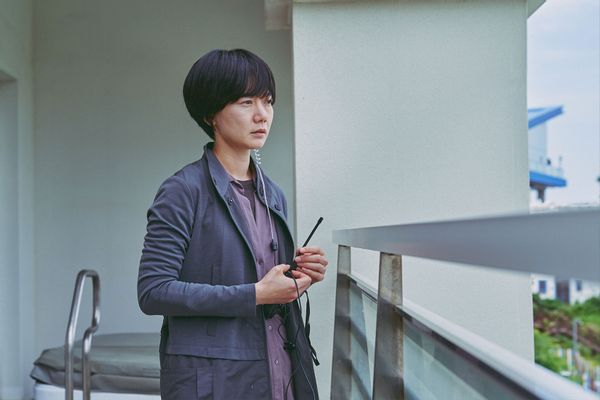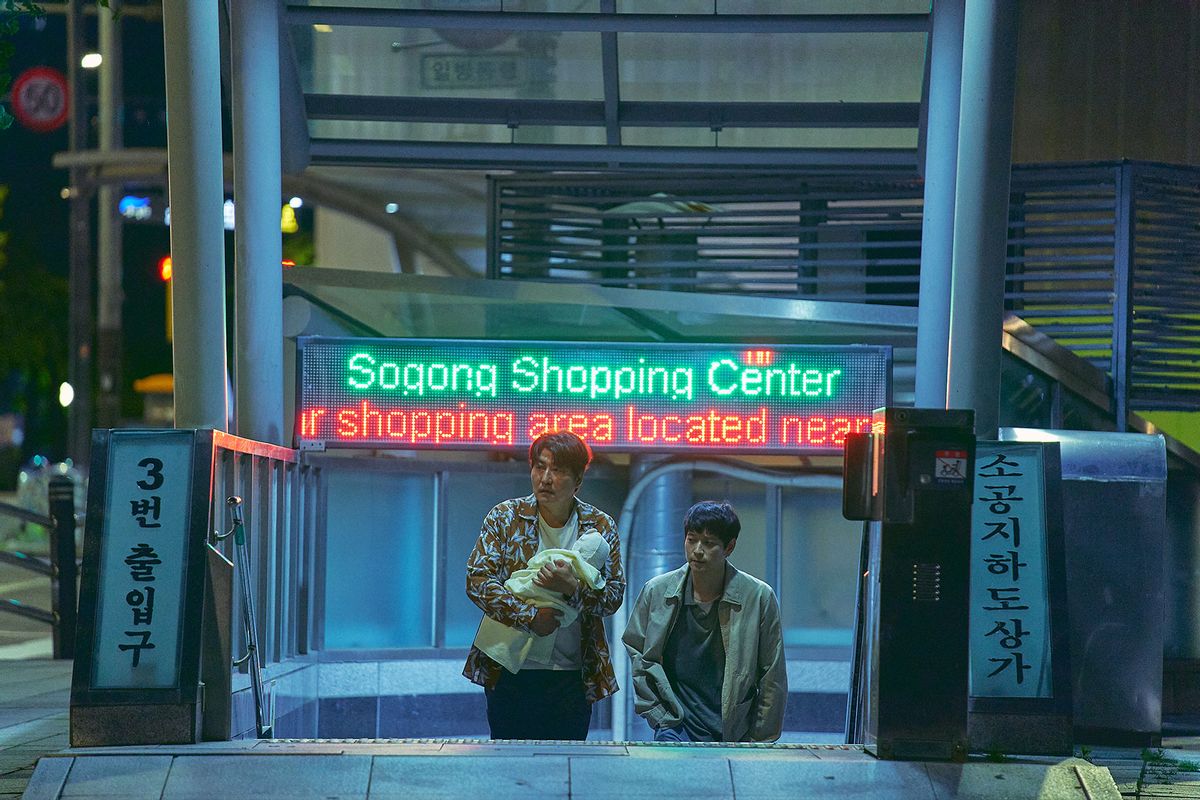Japanese writer/director Hirokazu Kore-eda's films — "Shoplifters," and "Still Walking" among them — are gentle dramas that sneak up on viewers, becoming achingly poignant and unexpectedly moving. His films often reconsider what makes a family, and Kore-eda's latest, the outstanding "Broker," set in South Korea, is no exception.
The full story slowly comes into focus, but the absorbing "Broker" never feels slow. A young woman, So-young (Lee Ji-eun, "My Mister") drops her baby, Woo-sung (Park Ji-yonh ) off at the Busan Family Church in front of a box designed for such anonymous deliveries. Lee (Lee Joo-young, "Itaewon Class") who along with Su-jin (Doona Bae, "Cloud Atlas"), witnesses this act, puts the baby in the hatch where Woo-sung is received by church volunteer, Dong-soo (Gang Dong-won). Dong-soo, however, takes the infant to his friend Sang-hyun (Song Kang-ho, "Parasite"), as they plan to sell the child to couples who cannot go through the traditional adoption route.
Dong-soo and Sang-hyun are committing a crime. And Su-jin is a sergeant in the police force — Lee is her colleague — hoping to catch the men in the act of selling the child. They have been staking out Sang-hyun. But what no one expects is for So-young to return for her son. That development has several implications, one being So-young hoping to get a portion of the cash that Dong-soo and Sang-hyun collect. However, as Su-jin later learns, there is a backstory regarding the identity of Woo-sung's father, and that introduces additional subplots, characters and storylines.
"Broker" shifts back and forth between the cops and the criminals as this slow-burn extended, low-key chase film unfolds. But Kore-eda keeps generating surprises that shift viewers' emotions and allegiances as more information is revealed about the characters.
The discussions about child welfare are also compelling. When So-young talks about how hard it is to raise a baby alone, Dong-soo counters, "How do you justify throwing him away?" To which she replies, "How do you justify selling him?" Likewise, a later debate about abortion vs. abandonment cuts to the quick for the characters — as when someone asks: which is less of a sin? Are the "brokers" kidnapping children or are they offering them protection? So-young calls their scheme theft, but the brokers say they are being benevolent, helping both the children and couples that cannot conceive.
 Broker (Neon)
Broker (Neon)
While the film poses these ethical dilemmas, Kore-eda is not preaching from a soapbox. His film tugs at viewers' thoughts and emotions — as when Dong-soo, visits the orphanage where he grew up. He recites a statistic that only 1 in 40 mothers return for their abandoned children. It is a poignant moment that at first divides Dong-soo and So-young, but then eventually draws them closer together as they are from opposite sides of the same equation.
What is more, one of the children at the orphanage, Hae-jin (Im Seung-soo), sneaks a ride in the van Sang-hyun is driving, and is quickly folded into the makeshift family. "Broker" becomes a kind of adventure for this ragtag crew, and the film injects moments of comedy, as when a cop pulls them over for the broken back door, or when they visit a car wash and Hae-jin rolls down his window. This playfulness allows the characters to loosen up and get to know and care about one another. And they all experience concern for Woo-sung when he develops a fever and needs to go to the hospital — another unexpected setback that may jeopardize their operation.
But scenes like these are why Kore-eda's film is so involving. Viewers will want Sang-hyun, Dong-soo and So-young to prevail, despite their illicit activity. As the brokers search for potential buyers, they field increasingly higher bids for Woo-sung. One encounter is a setup planted by Su-jin, who hopes to catch them, but a snag leads her to take another tactic.
Viewers will be rooting for Su-jin, too, and the formidable Doona Bae plays her character as no-nonsense cop laser-focused on her end game. A running joke has her almost always eating, but Kore-eda reveals her real humanity in an elegiac scene of her sitting in a car, talking on the phone to her husband, while her windshield wipers clear the rain. As she overhears Aimee Mann's "Wise Up," her tough exterior cracks and Su-jin releases all of her suppressed emotions. It is cathartic moment both for her and viewers.
Want a daily wrap-up of all the news and commentary Salon has to offer? Subscribe to our morning newsletter, Crash Course.
Song Kang-ho who won Best Actor at Cannes for his performance, also gets his share of memorable scenes, such as a tender episode on a Ferris wheel with Hae-jin, and later a heartbreaking meal he shares with his biological daughter.
"Broker" periodically raises the issue of whether So-young will have such an attachment to her baby that she will not be able to give Woo-sung up at the appointed time. The magic of Kore-eda's film is that viewers will experience considerable affection for his film's characters and Woo-sung's well-being.
This is a highly satisfying drama about love, families and forgiveness, starting over and creating a better life.
"Broker" opens Dec. 26 in New York and Dec. 28 in Los Angeles.
Read more
about this topic
- "Drive My Car" director says conversing in vehicles "makes it easier to reveal parts of yourself"
- Park Chan-wook's mesmerizing "Decision to Leave" is a dreamy seduction that plays with our trust
- Justin Chon on his heartbreaking "Blue Bayou": "I wanted to do justice to the adoptee community"
- In Netflix's "Found," three girls examine their identity as adoptees: "We continue to shed our skin"



Shares